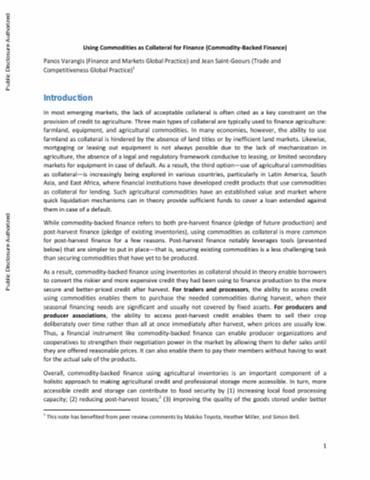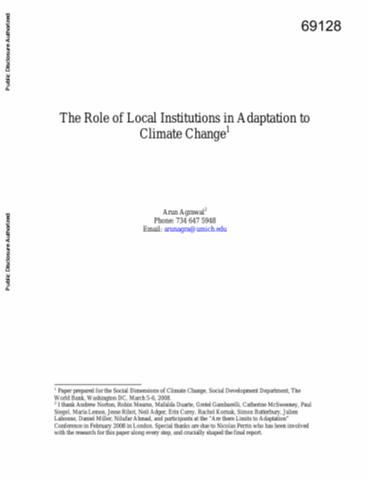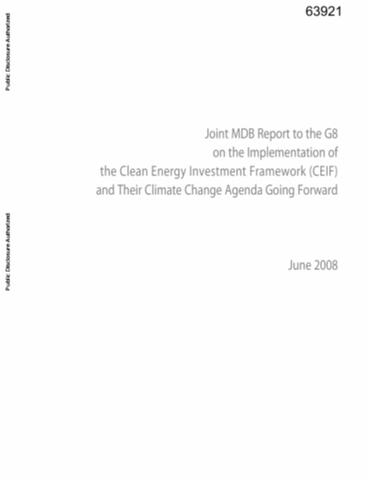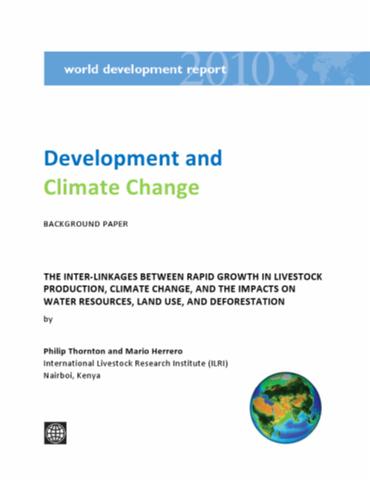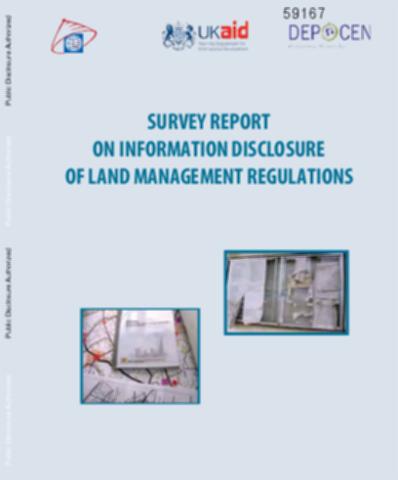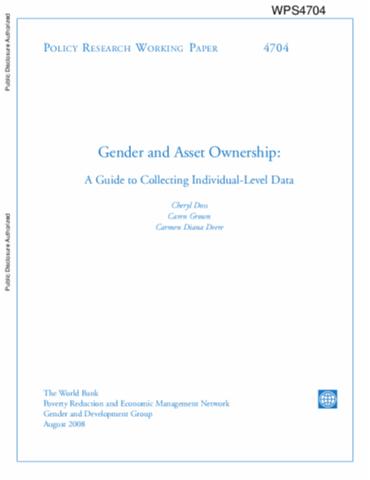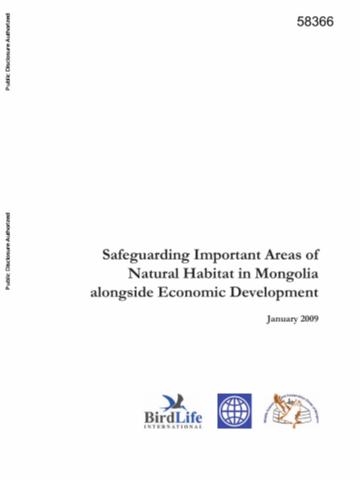
Topics and Regions
Details
Location
Contributions
Displaying 11 - 20 of 630Using Commodities as Collateral for Finance (Commodity-Backed Finance)
In most emerging markets, the lack of acceptable collateral is often cited as a key constraint on the provision of credit to agriculture. Three main types of collateral are typically used to finance agriculture: farmland, equipment, and agricultural commodities. In many economies, however, the ability to use farmland as collateral is hindered by the absence of land titles or by inefficient land markets.
The Role of Local Institutions in Adaptation to Climate Change
This review focuses on the role of local institutions in adaptation to climate change. It does so under the belief that climate impacts will affect disadvantaged social groups more disproportionately, and that local institutions centrally influence how different social groups gain access to and are able to use assets and resources.
Property Rights in a Very Poor Country: Tenure Insecurity and Investment in Ethiopia
This article provides evidence from one of the poorest countries in the world that the institutions of property rights matter for efficiency, investment, and growth. With all land state-owned, the threat of land redistribution never appears far off the agenda. Land rental and leasing have been made legal, but transfer rights remain restricted and the perception of continuing tenure insecurity remains quite strong. Using a unique panel data set, this study investigates whether transfer rights and implied tenure insecurity affect household investment decisions, focusing on trees and shrubs.
Joint MDB Report to the G8 on the Implementation of the Clean Energy Investment Framework and Their Climate Change Agenda Going Forward
The 2005 Gleneagles G8 summit in July 2005 stimulated a concerted effort of the Multilateral Development Banks (MDBs) to broaden and accelerate programs on access to energy and climate change mitigation and adaptation through the Clean Energy Investment Framework (CEIF). At the Gleneagles summit, it was agreed that a report on the implementation of the CEIF would be prepared for the 2008 G8 (Group of Eight: Canada, France, Germany, Italy, Japan, Russia, the United Kingdom, and the United States) summit hosted by Japan.
The Inter-Linkages between Rapid Growth in Livestock Production, Climate Change, and the Impacts on Water Resources, Land Use, and Deforestation
Livestock systems globally are changing rapidly in response to a variety of drivers. Human population growth, rapid urbanization, and growing incomes will lead to substantial increases in the demand for livestock products in the coming decades. Meeting this increased demand may put substantial pressure on a wide range of natural resources such as land and water. Together with climate change and increasing climate variability, these drivers of change add up to a formidable set of development challenges for developed as well as developing countries.
Survey Report on Information Disclosure of Land Management Regulations
Land, and its proper management, is a central issue in developing countries. Efficient use and management of land are key contributors to maximizing the potential benefits of sustainable socioeconomic development. Accurate and accessible land information is a necessary requirement for sustainable rural and urban development, which will contribute to the elimination of poverty. A well-functioning land market is crucial for achieving these goals and a prerequisite for a land market to function properly includes easy, rapid and cost-effective access to land information.
Gender and Asset Ownership : A Guide to Collecting Individual-Level Data
Ownership and control over assets such as land and housing provide direct and indirect benefits to individuals and households, including a secure place to live, the means of a livelihood, protection during emergencies, and collateral for credit that can be used for investment or consumption. Unfortunately, few studies - either at the micro or macro levels- examine the gender dimensions of asset ownership. This paper sets out a framework for researchers who are interested in collecting data on individual level asset ownership and analyzing the gender asset gap.
The Vanishing Farms? The Impact of International Migration on Albanian Family Farming
This paper investigates the impact of international migration on technical efficiency, resource allocation and income from agricultural production of family farming in Albania. The results suggest that migration is used by rural households as a pathway out of agriculture: migration is negatively associated with both labour and non-labour input allocation in agriculture, while no significant differences can be detected in terms of farm technical efficiency or agricultural income.
Safeguarding Important Areas of Natural Habitat in Mongolia alongside Economic Development
As market reforms to the Mongolian economy continue and the country enjoys rapid economic growth, the environment has entered a period of unprecedented pressure. Mining, infrastructure development and tourism development, in particular, are undergoing rapid expansion, and all pose risks to Mongolia's globally important biodiversity.
Implications of Alternate Policies on Welfare of Slum Dwellers : Evidence from Pune, India
In this paper we examine how slum dwellers value location-based amenities. In most developing country cities, residents living in slums have poor-quality dwellings and limited access to basic public services and amenities. Using data from Pune, India, we estimate the residential location choices of slum dwellers, which are conditional on housing quality, neighborhood amenities, and community structure. We use these estimates to simulate the impact of alternate interventions on household welfare. We find that households derive benefits from housing quality and neighborhood amenities.

